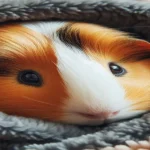Contents
- Introduction to Guinea Pig Care
- Overview of Basic Needs and Care Essentials for Guinea Pigs
- Seasonal Care: Do Guinea Pigs Hibernate?
- Diet and Nutrition: Can Guinea Pigs Eat [Various Foods]?
- Dental Health: Teeth Problems and Solutions
- Living Environment: Are Guinea Pigs Too Loud for an Apartment?
- Fun Section: The Best Guinea Pig Memes
- Conclusion
Introduction to Guinea Pig Care
Guinea pigs, or cavies, are small, social rodents with big personalities, making them delightful pets. Proper care is essential for a guinea pig’s health, happiness, and longevity. This comprehensive guide explores their health, dietary needs, seasonal care, dental health, and tips on ensuring they have a cozy, stress-free home environment. With these tips, you’ll have a better understanding of how to create a safe, engaging, and joyful environment for your guinea pig.
Overview of Basic Needs and Care Essentials for Guinea Pigs
Guinea pigs have distinct needs, and knowing their preferences for diet, environment, and activity will help you provide the best care:
1. Housing Essentials
- Cage Size: Guinea pigs need a large cage—ideally a minimum of 7.5 square feet for one or two guinea pigs.
- Bedding: Use soft, absorbent bedding like fleece liners or paper bedding. Avoid cedar or pine shavings as these can irritate their respiratory systems.
- Hideaways: Provide hideaways, like igloos or fleece tunnels, to help them feel secure.
2. Social Interaction
- Companionship: Guinea pigs are social creatures and thrive with a companion of the same sex. Consider adopting at least two so they have constant companionship.
- Daily Interaction: Spend time each day interacting with them to help them feel safe and build trust.
3. Dietary Needs
- Hay: Timothy hay is crucial for their digestive and dental health and should be available at all times.
- Vegetables and Fresh Greens: Fresh veggies, especially dark leafy greens like romaine lettuce and bell peppers, provide essential vitamins and minerals.
- Pellets: Choose fortified pellets with no added sugars, dyes, or seeds.
- Vitamin C: Since guinea pigs can’t produce vitamin C, incorporate foods high in this vitamin, like bell peppers or supplement drops, into their diet.
Seasonal Care: Do Guinea Pigs Hibernate?
Understanding Seasonal Behavior
Guinea pigs do not hibernate. However, during colder months, they may become less active, often due to environmental factors rather than a biological tendency. Because they are sensitive to extreme temperatures, keep their habitat within 65°F to 75°F (18°C to 24°C).
Winter Care Tips
- Insulate Their Cage: Add extra fleece covers or blankets around the cage’s outer sides to protect them from drafts.
- Additional Bedding: Add extra layers of bedding to help them stay warm.
- Location: Keep their cage in a warm, draft-free area of your home.
Summer Care Tips
In warmer months, guinea pigs are at risk of overheating. Use the following tips to keep them comfortable:
- Cooler Area: Place their cage in a cool, shaded area.
- Frozen Water Bottles: Wrap frozen bottles in cloth and place them near the cage to cool the air around them.
- Ventilation: Ensure good airflow, and avoid placing their cage in direct sunlight.
Diet and Nutrition: Can Guinea Pigs Eat [Various Foods]?
Safe Foods for Guinea Pigs
Guinea pigs can eat a variety of fresh fruits and vegetables, but moderation is key. Here’s a list of common fruits they can enjoy in small amounts:
- Can Guinea Pigs Eat Grapes?
- Answer: Yes, guinea pigs can eat grapes occasionally. They’re high in sugar, so offer sparingly.
- Can Guinea Pigs Eat Watermelon?
- Answer: Yes, but due to its high water content, too much watermelon can cause digestive upset. Provide a small piece as an occasional treat.
- Can Guinea Pigs Eat Strawberries?
- Answer: Yes, strawberries are safe and offer a vitamin C boost. However, limit their portion size to avoid excessive sugar intake.
- Can Guinea Pigs Eat Oranges?
- Answer: Yes, oranges contain vitamin C, but their acidity can irritate guinea pigs’ stomachs. Offer a tiny segment occasionally.
- Can Guinea Pigs Eat Blueberries?
- Answer: Yes, blueberries are safe and high in antioxidants. They’re another good occasional treat.
Foods to Avoid
Avoid feeding guinea pigs chocolate, onions, garlic, and dairy products, as these can cause serious health issues. Always introduce new foods slowly to monitor for allergies or sensitivities.
Dental Health: Teeth Problems and Solutions
Can Adult Guinea Pigs Grow Back Teeth?
Yes, guinea pigs’ teeth grow continuously throughout their lives. To keep them from overgrowing, always provide access to Timothy hay and safe chew toys, which help file down their teeth naturally.
Why Did My Guinea Pig’s Two Front Teeth Break Off?
Teeth breakage can happen from hard chewing or minor injuries. Broken teeth often regrow without issues, but a vet should examine them if you notice repeated breakage.
Caring for a Toothless Guinea Pig
Sometimes guinea pigs may need help if they’re temporarily or permanently toothless. Softened pellets, finely grated vegetables, and critical care formula can provide essential nutrition. Monitor them closely to ensure they’re maintaining a healthy weight.
Living Environment: Are Guinea Pigs Too Loud for an Apartment?
Guinea pigs are relatively quiet compared to other pets, but they do make sounds. They produce sounds like:
- Wheeking: Often heard when they’re hungry or excited.
- Purring: Indicates contentment, though sometimes used to express discomfort.
- Chirping: A rare sound that may occur when they’re feeling especially relaxed or sometimes distressed.
If noise is a concern in an apartment setting:
- Strategic Cage Placement: Place the cage in a room that won’t disturb neighbors.
- Soundproofing: Adding a layer of padding around the cage, like a rug or mat, can help absorb noise.
- Routine Attention: Guinea pigs wheek most when seeking food or attention, so regular interactions help keep them happy and more quiet.
Fun Section: The Best Guinea Pig Memes
Guinea pigs have become internet sensations, inspiring countless memes that capture their quirks, cuteness, and humorous personalities. Here are some popular meme themes:
- “I Squeak for Treats”: Guinea pigs are famous for their “wheeks” when they want food, inspiring memes about their treat demands.
- Cozy Blanket Burrito: Memes often show guinea pigs snuggled under blankets or fleece, symbolizing their love for cozy nooks.
- The “Zoomies”: Guinea pigs often run in bursts, or “zoomies,” which pet owners capture in funny videos and images, showing their energetic and unpredictable nature.
- Two’s Company: Guinea pigs are social and often “chat” with each other, leading to memes that capture their “conversations” and interactions.
These memes and trends highlight the fun, quirky behaviors that make guinea pigs beloved pets across the globe.
Conclusion
Caring for guinea pigs means understanding their unique needs for diet, dental health, and companionship, and creating a safe, comfortable environment. With this guide, you’ll be well-equipped to provide top-notch care, from managing seasonal temperature changes to understanding their favorite treats. Guinea pigs bring joy and personality into any home, and with proper care, they’ll live healthy, happy lives as cherished companions.
Keywords: can adult guinea pig grow back teeth, can guinea pigs eat grapes, watermelon, strawberries, oranges, blueberries, why guinea pig two front teeth broke off, toothless guinea pig, are guinea pigs too loud for an apartment, do guinea pigs hibernate, guinea pig meme

